Items
Theme is exactly
Coming Out
-
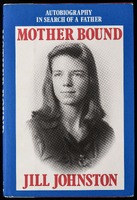 Autobiography in search of a father. Mother bound Jill Johnston (1929-2010) was a critic, journalist, feminist and leader of the lesbian-separatist movement in the 1970s. Before publishing perhaps her best-known work, ‘Lesbian Nation - The Feminist Solution’ in 1973, Johnston wrote on dance for the ‘Village Voice’ newspaper, and was the first of its columnists to come out in print. ‘Mother Bound’ details her complicated family relationships and narrates her life up to 1965. Characterised as “readably rambling, pseudo-psychological ponderings” by one somewhat withering reviewer, though notably less experimental in form than her later criticism, ‘Mother Bound’ was followed by a second volume of autobiography, ‘Paper Daughter’, in 1985.
Autobiography in search of a father. Mother bound Jill Johnston (1929-2010) was a critic, journalist, feminist and leader of the lesbian-separatist movement in the 1970s. Before publishing perhaps her best-known work, ‘Lesbian Nation - The Feminist Solution’ in 1973, Johnston wrote on dance for the ‘Village Voice’ newspaper, and was the first of its columnists to come out in print. ‘Mother Bound’ details her complicated family relationships and narrates her life up to 1965. Characterised as “readably rambling, pseudo-psychological ponderings” by one somewhat withering reviewer, though notably less experimental in form than her later criticism, ‘Mother Bound’ was followed by a second volume of autobiography, ‘Paper Daughter’, in 1985. -
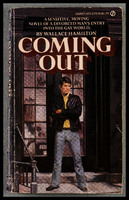 Coming out This novel tells the story of middle-aged divorcee Roger Thornton, and his new life as an out gay man residing in New York, in a relationship with the younger and more extrovert Michael. In addition to this central relationship, the novel features characters from the wider LGBT community including a lesbian couple and Lola, who we would now recognise as a trans woman. The book’s design is reminiscent of a pulp novel, complete with yellow edges. The blurb contains the word “sensitive” which was often used by publishers in the earlier half of the twentieth century to allude to gay men. Wallace Hamilton (1919?-1983) also wrote non-fiction and plays and was a contributor to the ‘New York Native’ paper. Like his character Roger, he was married and came out when he was middle-aged.
Coming out This novel tells the story of middle-aged divorcee Roger Thornton, and his new life as an out gay man residing in New York, in a relationship with the younger and more extrovert Michael. In addition to this central relationship, the novel features characters from the wider LGBT community including a lesbian couple and Lola, who we would now recognise as a trans woman. The book’s design is reminiscent of a pulp novel, complete with yellow edges. The blurb contains the word “sensitive” which was often used by publishers in the earlier half of the twentieth century to allude to gay men. Wallace Hamilton (1919?-1983) also wrote non-fiction and plays and was a contributor to the ‘New York Native’ paper. Like his character Roger, he was married and came out when he was middle-aged. -
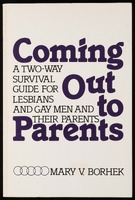 Coming out to parents : a two-way survival guide for lesbians and gay men and their parents In 1975, Mary Borhek (1922-2016) learnt that her son Steve was gay. As a member of the New Testament Church, Borhek initially believed homosexuality was a sin but, over the following years, she not only accepted Steve’s sexuality but became an activist for lesbian and gay rights, particularly within the church community. Borhek turned her experiences into two books aimed at supporting lesbians and gay men and their families – 1979’s ‘My Son Eric’ and, in 1983, the book that was seized during ‘Operation Tiger’, ‘Coming Out to Parents’. Borhek’s introduction to this book expresses sorrow that coming out still necessitates “such elaborate preparation”, and an example ‘Coming-out Letter from Rick to his Family’ is included at the end. The publisher of both books was the Christian Pilgrim Press.
Coming out to parents : a two-way survival guide for lesbians and gay men and their parents In 1975, Mary Borhek (1922-2016) learnt that her son Steve was gay. As a member of the New Testament Church, Borhek initially believed homosexuality was a sin but, over the following years, she not only accepted Steve’s sexuality but became an activist for lesbian and gay rights, particularly within the church community. Borhek turned her experiences into two books aimed at supporting lesbians and gay men and their families – 1979’s ‘My Son Eric’ and, in 1983, the book that was seized during ‘Operation Tiger’, ‘Coming Out to Parents’. Borhek’s introduction to this book expresses sorrow that coming out still necessitates “such elaborate preparation”, and an example ‘Coming-out Letter from Rick to his Family’ is included at the end. The publisher of both books was the Christian Pilgrim Press. -
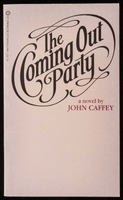 The coming out party : a novel Jaded by West Hollywood gay life, long-term lovers Cal and Sidney yearn for a new distraction. In this queer reworking of ‘My Fair Lady' they find one in a young gay man, overweight college student, Hal. They take him on as a project, schooling him in Tennessee Williams, ‘Brideshead Revisited’ and E.M. Forster’s ‘Maurice’ and putting him through a punishing programme of physical transformation. Republished in 2001 via self-publishing platform iUniverse, this second edition is described as “A novel so outrageous it was banned in England!”, a possible reference to ‘Operation Tiger’. The blurb also claims Caffey won a PEN Award for an Outstanding First Work of Fiction, receiving a Special Commendation in 1983. However, no evidence either for this specific award or this commendation can be found.
The coming out party : a novel Jaded by West Hollywood gay life, long-term lovers Cal and Sidney yearn for a new distraction. In this queer reworking of ‘My Fair Lady' they find one in a young gay man, overweight college student, Hal. They take him on as a project, schooling him in Tennessee Williams, ‘Brideshead Revisited’ and E.M. Forster’s ‘Maurice’ and putting him through a punishing programme of physical transformation. Republished in 2001 via self-publishing platform iUniverse, this second edition is described as “A novel so outrageous it was banned in England!”, a possible reference to ‘Operation Tiger’. The blurb also claims Caffey won a PEN Award for an Outstanding First Work of Fiction, receiving a Special Commendation in 1983. However, no evidence either for this specific award or this commendation can be found. -
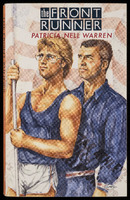 The front runner After the Stonewall Uprising, many mainstream publishers realised they could have commercial success with gay fiction. ‘The Front Runner’ was the first bestselling novel of this era, selling millions of copies when first published in 1974 by William Morrow. The story concerns Billy Sive, a young, gay athlete training for the 1976 Olympics, and his relationship with his older sports coach. Patricia Nell Warren (1936-2019), who was also an athlete, considered the novel’s publication to be a step in her own coming-out process. Latterly, Warren self-published lesbian fiction under the Wildcat Press imprint, fought online censorship laws and was one of the initial fifty nominees for the National LGBTQ Wall of Honor in New York City. The edition seized was probably the 1975 Bantam Books paperback rather than the one on display here.
The front runner After the Stonewall Uprising, many mainstream publishers realised they could have commercial success with gay fiction. ‘The Front Runner’ was the first bestselling novel of this era, selling millions of copies when first published in 1974 by William Morrow. The story concerns Billy Sive, a young, gay athlete training for the 1976 Olympics, and his relationship with his older sports coach. Patricia Nell Warren (1936-2019), who was also an athlete, considered the novel’s publication to be a step in her own coming-out process. Latterly, Warren self-published lesbian fiction under the Wildcat Press imprint, fought online censorship laws and was one of the initial fifty nominees for the National LGBTQ Wall of Honor in New York City. The edition seized was probably the 1975 Bantam Books paperback rather than the one on display here. -
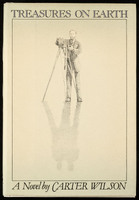 Treasures on earth : a novel This novel is a fictionalised depiction of a real expedition to Machu Picchu in Peru which was undertaken by Hiram Bingham in 1911. Running parallel to the main narrative is the story of the trip’s photographer, Willie Hickler, who discovers his sexuality when he falls in love with the expedition’s Peruvian assistant, Ernesto. Author Carter Wilson (1942?-), who later became an academic and Professor of Community Studies, described this book as “my coming-out novel”. The book was published by the well-established Knopf imprint and received good reviews, including from Christopher Isherwood who compared it to E. M. Forster’s ‘A Passage to India’.
Treasures on earth : a novel This novel is a fictionalised depiction of a real expedition to Machu Picchu in Peru which was undertaken by Hiram Bingham in 1911. Running parallel to the main narrative is the story of the trip’s photographer, Willie Hickler, who discovers his sexuality when he falls in love with the expedition’s Peruvian assistant, Ernesto. Author Carter Wilson (1942?-), who later became an academic and Professor of Community Studies, described this book as “my coming-out novel”. The book was published by the well-established Knopf imprint and received good reviews, including from Christopher Isherwood who compared it to E. M. Forster’s ‘A Passage to India’.
